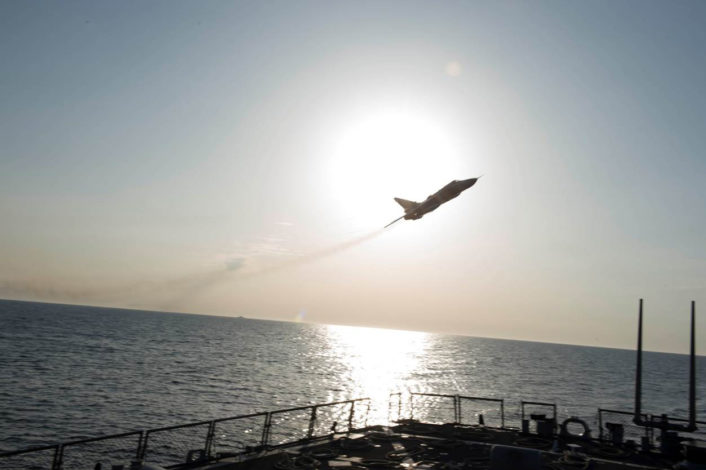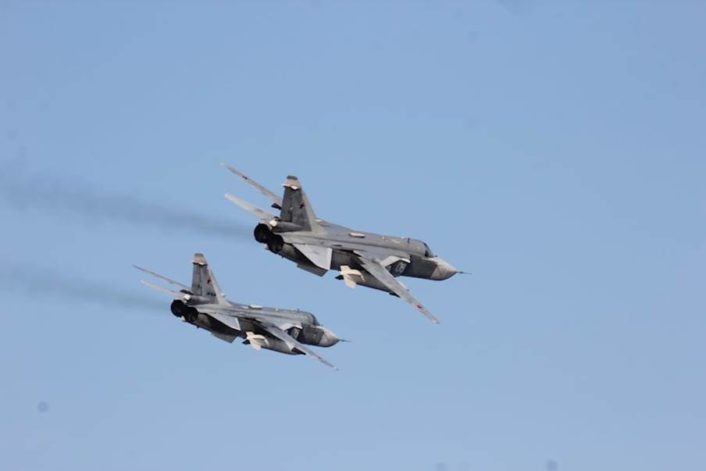By New Jersey DHS
Hizballah
Hizballah is an Islamic militant group based in Lebanon and allied with Iran. Its primary goal is the destruction of Israel.

- Since 2013, Hizballah has plotted attacks against Israeli citizens and institutions in Europe, South America, Southeast Asia, the Middle East, and Africa. In January, five Palestinians were arrested on suspicion of joining a Hizballah cell and planning a suicide bombing and shooting in the West Bank. In June 2015, a Hizballah member pled guilty to acquiring nine tons of ammonium nitrate in Cyprus, which was intended for attacks against Israelis.
- Although Hizballah possesses the capability to attack the United States and Western interests, the group is focused on supporting Bashar al-Assad’s regime in Syria. Hizballah receives training, weaponry, and about $200 million per year from Iran.
- In 2013, Hizballah’s involvement in the Syrian conflict shifted from an advisory to a combat role. The group’s commitment is demonstrated by the number of personnel it has dispatched to Syria—Western media estimate 6,000 to 8,000 fighters, or roughly one-quarter of its assessed fighting force.
Threat to New Jersey: Low
The terror threat from Hizballah to New Jersey is low because the group’s resources and efforts are focused on supporting the Assad regime in Syria. Nonetheless, group supporters and sympathizers are active in the New Jersey region, primarily in fundraising.

- In February, the Drug Enforcement Administration (DEA)—to include its Newark office—and international agencies across seven countries uncovered a global Hizballah drug and money-laundering scheme. In October 2015, federal authorities in New York—acting in concert with the Newark DEA office—arrested two Hizballah associates for conspiring to launder narcotics proceeds and international arms trafficking.
- In July 2013, Moussa Ali Hamdan, a former New Jersey resident, was sentenced in Philadelphia for providing proceeds from counterfeit goods sales to Hizballah.
US Nexus
- Since 2005, approximately 20 Hizballah-related cases have been prosecuted in the United States. Half of the cases were along the East Coast, including in New York and Pennsylvania. None were in New Jersey.
- Hizballah has never conducted an attack on US soil, but it has targeted the US military in Lebanon, including the bombing of a US Marine compound in 1983 in Beirut, which killed 241 US personnel.
DEA: Hizballah Drug Trafficking and Money Laundering Arrests
In January, the Drug Enforcement Administration (DEA), along with its European counterparts, arrested members of Hizballah’s External Security Organization Business Affairs Component in Europe for drug trafficking and money laundering, the proceeds of which transited through Lebanon to support Hizballah operations in Syria. The DEA operation, known as Project Cassandra, involved law enforcement agencies from seven countries and targeted Hizballah’s cocaine trafficking in the United States and Europe.

- Hizballah developed business relationships with South American drug cartels supplying cocaine to the US and European markets. According to the DEA, Hizballah laundered the drug revenue through the acquisition and sale of high-valued vehicles, sometimes concealing money inside vehicles shipped internationally.
- In February 2015, European authorities launched an investigation based on DEA leads and discovered a network of couriers collecting and transporting drug proceeds—in the form of euros—from Europe to the Middle East. The revenue was then transferred to Colombian cartels using the hawala disbursement system, a payment network based on trust and the use of family and regional connections.
- US agencies participating in Project Cassandra include the Newark DEA office, US Customs and Border Protection, the US Treasury’s Financial Crimes Enforcement Network, and the US Treasury Office of Foreign Assets Control. Officials did not specify the number of individuals arrested nor the location of arrests in Europe. The investigation is ongoing.
Exploiting Outbound Cargo Vulnerabilities
Hizballah continues to launder narcotics proceeds through US maritime ports by leveraging the inundated outbound cargo shipment process and concealing contraband in otherwise legal outbound vehicle shipments. Since October 2015, Customs and Border Protection (CBP) in the Port of New York and New Jersey has processed more than 25,000 export vehicle titles per month in accordance with current regulations and performed, on average, more than 500 physical vehicle examinations per month.
- This year, the Drug Enforcement Administration’s Project Cassandra targeted a Hizballah network selling narcotics in the United States and Europe and laundering the proceeds through the acquisition and sale of high-end vehicles, sometimes concealing money inside vehicles shipped internationally.
- In 2011, US authorities filed a civil money-laundering suit against three Lebanese financial organizations and two Beirut-based money exchange houses, accusing them of wiring at least $329 million in drug proceeds to 30 used car dealerships in the United States—one located in North Arlington (Bergen County).
- In 2010, the FBI disrupted two Hizballah-linked schemes—one in Virginia where money was hidden in tires of used vehicles being shipped via maritime vessels to Lebanon, and another in Ohio where authorities arrested a couple for attempting to conceal $200,000 in a vehicle they planned to ship to Lebanon.
The Port of New York and New Jersey has implemented mitigation strategies to stop the movement of contraband through outbound cargo in New Jersey. For example, in 2005, CBP, US Immigration and Customs Enforcement, Homeland Security Investigations, and other federal, state, local, and international law enforcement agencies created the Border Enforcement Security Task Force—more commonly known as BEST—to coordinate information sharing between agencies. In addition, CBP’s Customs Trade Partnership Against Terrorism encourages private-sector companies to provide information about suspicious activity related to cargo shipments.
Interwoven Money Laundering and Smuggling Systems

Hizballah’s profits from narcotics and other criminal activity are transferred via multiple forms of money laundering and illicit enterprises, including hawala money exchanges, the Black Market Peso Exchange (BMPE), and bulk cash smuggling. In March, the Director of the Stein Program on Counterterrorism and Intelligence at the Washington Institute for Near East Policy reported to Congress that despite receiving up to $200 million from Iran each year, Hizballah uses various criminal methods to generate additional revenue and fund its involvement in Syria.
- Hizballah operatives can transfer cash quickly and without an audit trail by using the hawala remittance system, an informal currency transfer system operating outside or parallel to traditional banking and financial channels.
- In February, the Drug Enforcement Administration revealed—as part of its Project Cassandra investigation—Hizballah leverages the BMPE, which uses trade-based money laundering to disguise proceeds from illegal activity.
- Hizballah smuggles large sums of money from the United States, South America, and Europe via couriers and airport employees. The arrest of a ground services coordinator at Chicago’s O’Hare International Airport in 2007 demonstrates Hizballah supporters have bypassed airport security to transport packages of cash—in this case up to $100,000—intended to finance Hizballah operations in Lebanon.






 , until Trump rose in the polls.
, until Trump rose in the polls.